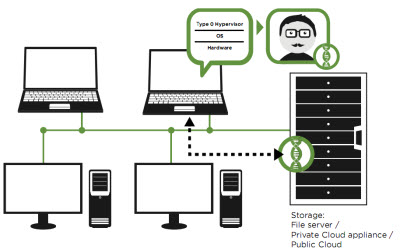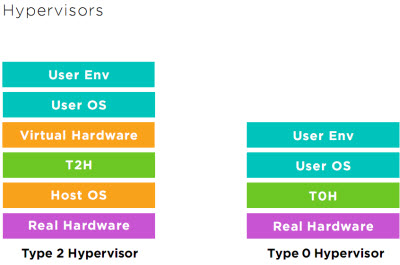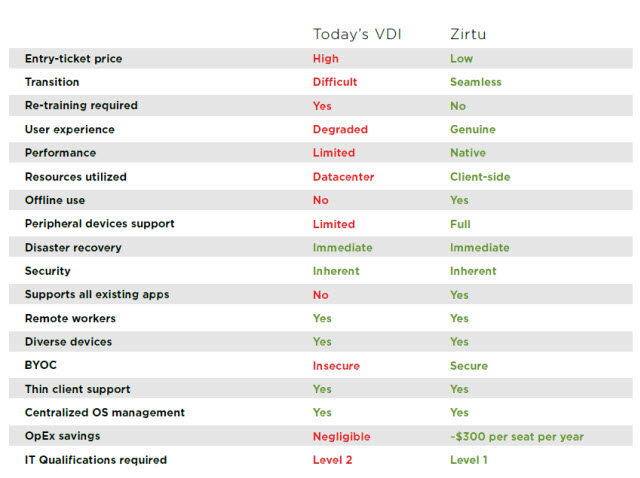 A lot of companies are trying to use a combination of cloud computing and virtualization to bring down the cost of corporate computers. But Zirtu believes it has the right solution.
A lot of companies are trying to use a combination of cloud computing and virtualization to bring down the cost of corporate computers. But Zirtu believes it has the right solution.
The Torrance, Calif.-based company says it can simplify computer management, slash costs, and make users happy without forcing them to adopt brain-dead thin clients.
Zirtu does this by creating what it calls a Type 0 hypervisor (see illustration below). A hypervisor (or virtual machine) allows a computer to run multiple operating systems, allowing a user to work with one operating system and a corporate administrator to manage the machine using a different software layer.
Zirtu creates what it calls a Virtual DNA Container. That is, it takes all of the personalization data of the user (the user’s DNA, so to speak), as well as the applications installed on the user’s machine, and puts it in a virtual container, a sealed-off part of the corporation’s central storage system that is dedicated to that user alone. When the user logs in, he or she accesses that container, which runs on the user’s machine.
 Jake Liff, customer advocate and co-founder for Zirtu, said in an interview that the company’s hypervisor removes some of the usual software layers and eliminates the need for management servers in the central data center. It uses centralized storage instead, running the centrally-stored user containers directly on the user machines. And it doesn’t need a secondary operating system or centralized server hardware to run.
Jake Liff, customer advocate and co-founder for Zirtu, said in an interview that the company’s hypervisor removes some of the usual software layers and eliminates the need for management servers in the central data center. It uses centralized storage instead, running the centrally-stored user containers directly on the user machines. And it doesn’t need a secondary operating system or centralized server hardware to run.
“This market is ready for disruption,” Liff said. “We remove the barriers to desktop virtualization.”
Nothing is actually installed on the user’s own computer. In computer lingo, that means it’s “stateless.” A user could log into the corporate network from another computer and get access to his or her personal data. Users can bring their own computers to work, too. The computer is protected via the corporate management layer. And you can get easy disaster recovery.
The benefits add up. Users can work online or offline and still get access to their corporate software. Mobile workers can work while connected; if the machine becomes disconnected, the computer still functions and has access to the corporate software. The next time they connect, the computer is synchronized with the cloud. Users also get the benefit of using the full power of their PCs and laptops. They don’t have to put up with handicapped thin-client machines that function only when connected.
Corporations like it because it lowers their computing costs dramatically, without driving up the costs of centralized computing functions. The company can get by with fewer software licenses. Best of all, the corporation can get by with significantly fewer servers, eliminating costs in the data center.
“We remove servers from the equation,” Liff said.
Zirtu was founded in 2009 and now has under 100 employees. The company is self-funded.
The space has so much potential that it has drawn a lot of rivals. Citrix and VMware are attacking the virtualization market, but they generally have drawbacks of high costs, higher data center requirements, constant connectivity requirements, and limited performance. Other rivals include Mokafive, RingCube, Wanova, AppSense, and Kaviza (which was acquired by Citrix). The rivals are all using software layering to get the best of both worlds, accommodating users and lowering overall information technology costs.
But Liff said that Zirtu has advantages over those rivals with its Virtual DNA Containers. Zirtu has spent a considerable amount of time creating its Type 0 hypervisor and doesn’t believe anyone can easily duplicate it. Zirtu charges $120 per user per year.

Zirtu is one of 80 companies chosen by VentureBeat to launch at the DEMO Fall 2011 event taking place this week in Silicon Valley. After our selection, the companies pay a fee to present. Our coverage of them remains objective.
VentureBeat's mission is to be a digital town square for technical decision-makers to gain knowledge about transformative enterprise technology and transact. Learn More
